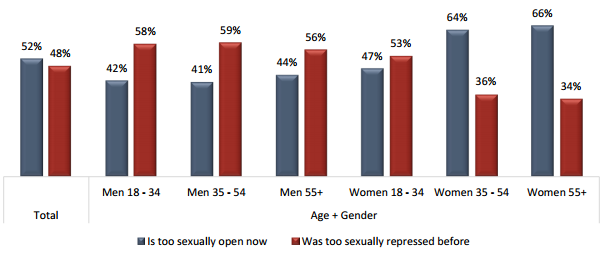An academic is questioning a Christian think tank’s survey showing that six in 10 Canadian women feel society is too “sexually open” these days, while about the same number of men felt it was too sexually repressed in the past.

University of Calgary Prof. Rebecca Sullivan felt the survey treated sexuality and spirituality as “antithetical” to each other — and that’s a “dangerous” move that can lead to policies that could limit women’s access to abortion, she added.
“We just need to stop asking questions that suggest that someone’s spiritual piety can be proven by their level of sexual repression,” Sullivan told Global News.
“It’s dangerous.”
But Cardus, the think tank, is challenging her characterization of the research.
Cardus, a Hamilton-based think tank that does research from a Christian perspective, partnered with the Angus Reid Institute on a survey titled “Spirituality in a changing world,” whose results were released Wednesday.
The survey came as part of the Faith in Canada 150 project, which aims to celebrate spiritual belief as the country reaches its 150th birthday.
It heard from 2,006 Canadian adults who were members of the Angus Reid Forum between March 29 and April 3.
READ MORE: The Swedish government really wants to know if people are having less sex
- Canadian man dies during Texas Ironman event. His widow wants answers as to why
- Invasive strep: ‘Don’t wait’ to seek care, N.S. woman warns on long road to recovery
- ‘Super lice’ are becoming more resistant to chemical shampoos. What to use instead
- Canadians more likely to eat food past best-before date. What are the risks?
It asked questions on various topics, such as respondents’ faith and their views on whether Canada is too “sexually open,” or was too “sexually repressed” in the past.
Respondents were asked to say which of the following two options was closer to their point of view:
- Our society:
- Is too sexually open today
- Was too sexually repressed before
A Wednesday news release from Cardus highlighted “surprising findings” such as that 60 per cent of female respondents felt society is “too sexually open” today, while 57 per cent of men felt it was “too sexually repressed” in the past.
About 37.3 per cent of female respondents were aged 55 and over, and 35.2 per cent of women were aged 35 to 54.
Women aged 18 to 34 years old represented 27.5 per cent of respondents.
The survey had a margin of error of +/- 2.2 percentage points.
Their answers are encapsulated in the graph below:

Cardus program director Andrea Mrozek told Global News that the findings were interesting because many of these older women grew up during the “sexual revolution,” an era that changed attitudes around sexuality through the 1960s and the 1970s.
Today, she said women are likely rejecting the highly sexualized images they see of themselves in media and marketing materials.
“If you walk through the mall and you see Victoria’s Secret advertising in your regular, run-of-the-mill mall, it’s a highly, highly sexualized version of women that’s being presented and it seems quite obvious to me that women would reject that,” Mrozek said.
But Sullivan, an academic who specializes in gender and sexuality, said the results were more a reflection of the age of many respondents.
“Older, more spiritually devout women tend to be more sexually conservative,” she said.
Cardus’ survey also showed that those who are more “religiously committed” overwhelmingly (73 per cent) felt that society was too sexually open.
By contrast, only 35 per cent of “non-believers” felt that way.
Twenty-one per cent of respondents to the survey considered themselves “religiously committed”; 19 per cent considered themselves to be “non-believers.”
Sullivan took issue with that finding — and with the nature of the questions that were asked in the survey.
“This is, you know, concocting an aggregate out of some pretty clear specifics,” she said. “Older, more religiously dogmatic women are helping to skew the results.”
READ MORE: Why online porn is worse for your son than your dad’s sexy magazines were for you
Sullivan’s prime concern about Cardus’ survey is that it treated sexuality and spirituality as directly opposed to each other, she said.
“There are ways to bridge spirituality and sexuality to recognize that a healthy, pleasurable, consent-oriented sexuality can and is a part of many people’s spirituality,” Sullivan said.
“However, there still remain many orthodoxies that insist on a separation of spiritual enlightenment and a right to sexual pleasure.”
Sullivan went on to say that treating spirituality and sexuality this way can lead to “bad social policy” that could, for example, limit the number of abortion clinics in a given area, or foster attitudes that would prevent decriminalizing sex work.
She also claimed that the survey didn’t look at the links between faith and issues such as poverty or social justice.
The survey asked people a range of questions about their faith and other topics, including whether they felt rich people should share their wealth with people who were less fortunate.
Those who were more “religiously committed” were more likely to say they should.
In an email, Mrozek countered Sullivan’s claim that the survey’s finding was “dangerous.”
“As a research organization, there is nothing safer than asking questions and going where the evidence leads,” she said.
“We partnered with one of Canada’s premier pollsters who asked fair and simple questions about Canadians’ views on a range of issues, so it’s a completely incorrect to infer those questions make any suggestion about anyone’s spiritual piety.”







Comments